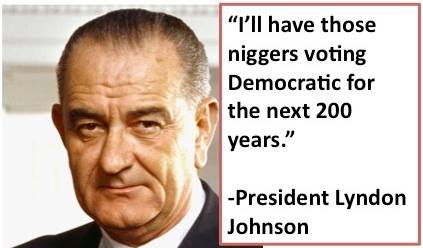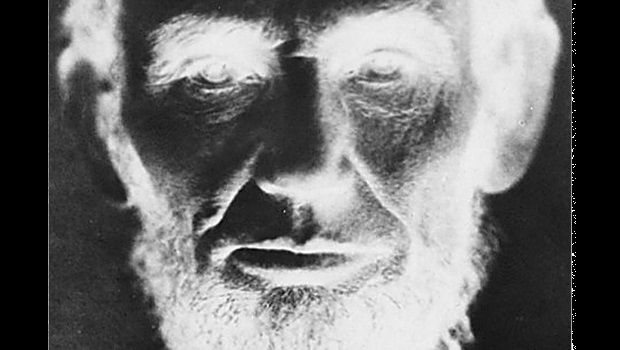“Johnson, like other presidents, would often reveal his true motivations in asides that the press never picked up. During one trip, Johnson was discussing his proposed civil rights bill with two governors. Explaining why it was so important to him, he said it was simple: ‘I’ll have them niggers voting Democratic for two hundred years.’
“‘That was the reason he was pushing the bill,’ said MacMillan, who was present during the conversation. ‘Not because he wanted equality for everyone. It was strictly a political ploy for the Democratic Party. He was phony from the word go.’”[1]
Ronald Kessler’s retelling of MacMillan’s story was rehearsed by U.S. News and World Report’s chief White House correspondent Kenneth Walsh. Walsh introduces Kessler’s anecdote with the idea that “MacMillan said Johnson also let his hypocritical side show.” Walsh then adds: “Yet historians who have studied Johnson’s life, such as [Robert] Dallek, say Johnson was genuinely committed to civil rights. Their interpretation of such behavior is that he occasionally used offensive language to shock people or to impress other politicians with his tough-mindedness.”[2]
Reacting to LBJ’s statement that “There’s [sic] more niggers voting there [in Texas] than white folk,” one poster to a “DemocraticUnderground” thread writes: “Looked that up, and that tape was transcribed in the 2002 book Reaching for Glory: Lyndon Johnson’s Secret White House Tapes, 1964-1965 by presidential historian (and far more reliable source than [right-leaning news media outfit] Newsmax writer Ronald Kessler) Michael Beschloss. That clip above comes from a telephone call from the president to Georgia governor Carl Sanders on May 13, 1965, and Beschloss transcribes LBJ as using ‘nigras’ rather than the long-form slur. Beschloss explains in that call, Gov. Sanders ‘complains that the Johnson administration is pushing him too hard to desegregate Georgia schools,’ and the president ‘shows his visceral understanding of the dilemmas of a Southern racial moderate.’”[3]
Apparently missed by this writer was the fact, implied elsewhere in Beschloss’s book, that LBJ’s accent leaves some room for doubt about whether he actually used the forbidden “n”-word.
After quoting LBJ as saying “God God Almighty, yeah! You’re going to be teaching these Nigras how to vote!” there is a footnote from which reads as follows:
“Some who have heard this tape think that LBJ is saying ‘niggers.’ To the author’s ear, he says, ‘Nigras.’”[4]
By inference, this same “did I hear what I thought I heard?” reaction might well – and arguably will – accompany any utterance by LBJ of the relevant mystery word.
The MSNBC columnist Adam Serwer is more forthright. He notes: “According to Johnson biographer Robert Caro, Johnson would calibrate his pronunciations by region, using ‘nigra’ with some southern legislators and ‘negra’ with others. Discussing civil rights legislation with men like Mississippi Democrat James Eastland, who committed most of his life to defending white supremacy, he’d simply call it ‘the nigger bill’.”[5]
Serwer then bluntly confesses: “Lyndon Johnson said the word ‘nigger’ a lot. In Senate cloakrooms and staff meetings, Johnson was practically a connoisseur of the word.”[6]
Elsewhere, an opinionator writes: “The comments in ...[Reddit’s] AskHistorians [subreddit] thread confirm that the quote is consistent with Johnson’s language in that he often used the n-word. However, the quote is not consistent with the sentiments he conveyed in other private conversations.” [7]
The received view is, to borrow the title of Serwer’s article, “Lyndon Johnson Was a Civil Rights Hero, but Also a Racist.”[8]
“He truly believed in equal rights, he just lived at a time when someone could say the n-word and no one would think anything of it.”[9]
Dissenters can surely be forgiven for dismissing this flourish as a mere profession of faith – in “civil rights” or in Johnson, or both. After all, political opportunism in this area goes back at least to the Civil War.
“As the economic pressures and frustrations of war mounted, government figures and newspapers in both the North and South denounced Jewish businessmen as ‘extortionists,’ ‘counterfeiters,’ ‘blockade-runners,’ ‘gougers.’ In a particularly notorious episode of December 1862, General Ulysses Grant issued a directive, Order Number 11, for the expulsion of all Jews ‘as a class’ from Tennessee, Mississippi, and Kentucky, a zone of Union military occupation. Northern carpetbaggers had descended upon this region, and in violation of government regulations were engaging in rampant cotton speculation. Jews among the speculators doubtless were identifiable by their German accents.”[10]
Grant’s General Order No. 11 described how throngs of predominantly Jewish carpetbaggers were infiltrating the southern states in order to capitalize (in both economic and figurative senses) on the alienation of white Southerners from the political system.[11]
It is worth recalling that Abraham Lincoln was a Republican.[12] In the aftermath of the Civil War, the major political losers were Southern Democrats.[13] “In 1867, following the passage of the Military Reconstruction Act and the advent of Congressional Reconstruction, the combination of black suffrage and political activity by native scalawags and northern carpet-baggers completely ousted white Democrats from political power.”[14]
It is therefore highly plausible that later Southern Democrats, like slippery politico and Texas-native Lyndon Baines Johnson, would not make the same mistakes twice.
[1] Ronald Kessler, Inside the White House, New York: Pocket Books; Simon and Schuster, 1996, p. 33; citing interview with one Robert M. MacMillan, Mar. 28, 1993; archived online at <https://books.google.com/books?id=lJz-yIZNE2sC&pg=PA33>. Kessler says that MacMillan “was a “steward on Air Force One,” ibid., p. 2; archived online at <https://books.google.com/books?id=lJz-yIZNE2sC&pg=PA3>.
[2] Kenneth T. Walsh, Air Force One: A History of the Presidents and Their Planes, New York: Hyperion, 2003, p. 81; archived online at <https://books.google.com/books?id=4-4lc7rr5hMC&pg=PA81>.
[3] “alp227,” “Conservatives Smear LBJ With Questionably Sourced Racist Quote,” DemocraticUnderground, Mar. 6, 2014, <http://www.democraticunderground.com/10024619565>.
[4] Lyndon Baines Johnson, Reaching for Glory: Lyndon Johnson’s Secret White House Tapes, 1964-1965, Michael R. Beschloss, ed., New York: Simon and Schuster, 2002, p. 127, n. 2.
[5] Adam Serwer, “Lyndon Johnson Was a Civil Rights Hero, but Also a Racist,” MSNBC, Apr. 11, 2014, updated Apr. 12, 2014, <http://www.msnbc.com/msnbc/lyndon-johnson-civil-rights-racism>.
[6] Ibid.
[7] Darrell Francis, “Did LBJ really say “I’ll have those n*****s voting Democrat for two-hundred years” when passing the Great Society legislation?,” Quora, Jun. 11, 2014, <http://www.quora.com/Did-LBJ-really-say-Ill-have-those-n*****s-voting-Democrat-for-two-hundred-years-when-passing-the-Great-Society-legislation>.
[8] Serwer, loc. cit.
[9] Francis, loc. cit.
[10] Howard M. Sachar, A History of the Jews in the Modern World, New York: Knopf; Doubleday, 2007, pp. 166-167.
[11] Robert Nicholson Scott, ed., The War of the Rebellion: A Compilation of the Records of the Union and Confederate Armies, Washington: Govt. Printing Office, 1880-1901, vol. 17, part 2; archived online at Ohio State Univ., 2005, <http://ehistory.osu.edu/osu/sources/records/>.
[12] Arguably, the Civil War was fought over monetary issues and the question of the balance of state power versus federal power. Lincoln himself famously stated: “My paramount object in this struggle is to save the Union, and is not either to save or to destroy slavery. If I could save the Union without freeing any slave I would do it, and if I could save it by freeing all the slaves I would do it; and if I could save it by freeing some and leaving others alone I would also do that.” Abraham Lincoln, “Letter to Horace Greeley,” Aug. 22, 1862; reproduced by Roy P. Basler, ed., Collected Works of Abraham Lincoln, New Brunswick, N.J.: Rutgers Univ. Press, 1953-59; archived online at Abraham Lincoln Online, <http://www.abrahamlincolnonline.org/lincoln/speeches/greeley.htm>.
[13] The U.S. Constitution was the agreement by which the individual States created a well-defined Federal government. The Federal government's powers were specifically enumerated in the Constitution. Here was the South's argument:
(1) The Tenth Amendment makes clear that “The powers not delegated to the United States by the Constitution, nor prohibited by it to the States, are reserved to the States respectively, or to the people.”
(2) The United States was no delegated powers with respect to the issue of slavery.
(3) Therefore, powers with respect to the issue of slavery are reserved to the States respectively, or to the people.
[14] Brian S. Wills, “,”Richard Zuczek, Encyclopedia of the Reconstruction Era: A-L, Westport, Conn.: Greenwood Publ., 2006, pp. 358-359.


